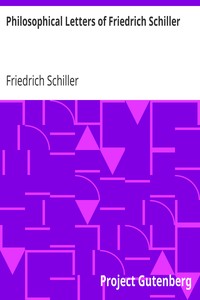Philosophical Letters of Friedrich Schiller by Friedrich Schiller
"Philosophical Letters of Friedrich Schiller" by Friedrich Schiller is a collection of philosophical essays written during the late 18th to early 19th century. The work presents a dialogue between two characters, Julius and Raphael, who engage in deep discussions about the nature of reason, morality, and the human spirit, reflecting on the connections between intellectual contemplation and emotional experience. The opening of the text sets the stage for a profound exploration of
philosophical thought. Julius expresses his feelings of melancholy following Raphael's departure, reflecting on the ideals and wisdom he gained from their friendship. He grapples with the tumultuous emotions that emerge when one begins to question previously accepted beliefs about existence, creation, and the nature of God. The letters reveal Julius's struggle with newfound skepticism that challenges the comforting beliefs he once held, while Raphael, through their correspondence, serves as both a mentor and challenger, guiding Julius in his search for deeper understanding. This dynamic set in the opening illustrates the interplay between joy and suffering in the quest for truth, setting a philosophically rich tone for the essays that follow. (This is an automatically generated summary.)
Read now or download (free!)
| Choose how to read this book | Url | Size | ||||
|---|---|---|---|---|---|---|
| Read online (web) | https://sendtokindle.compellingsciencefiction.com/ebooks/6799.html.images | 171 kB | ||||
| EPUB3 (E-readers incl. Send-to-Kindle) | https://sendtokindle.compellingsciencefiction.com/ebooks/6799.epub3.images | 129 kB |
Send
to kindle email: |
|||
| EPUB (no images, older E-readers) | https://sendtokindle.compellingsciencefiction.com/ebooks/6799.epub.noimages | 131 kB | ||||
| Kindle | https://sendtokindle.compellingsciencefiction.com/ebooks/6799.kf8.images | 280 kB | ||||
| older Kindles | https://sendtokindle.compellingsciencefiction.com/ebooks/6799.kindle.images | 268 kB | ||||
| Plain Text UTF-8 | https://sendtokindle.compellingsciencefiction.com/ebooks/6799.txt.utf-8 | 149 kB | ||||
| Download HTML (zip) | https://www.gutenberg.org/cache/epub/6799/pg6799-h.zip | 127 kB | ||||
| There may be more files related to this item. | ||||||
About this eBook
| Author | Schiller, Friedrich, 1759-1805 |
|---|---|
| Title | Philosophical Letters of Friedrich Schiller |
| Note | Reading ease score: 54.6 (10th to 12th grade). Somewhat difficult to read. |
| Credits | Produced by Tapio Riikonen and David Widger |
| Language | English |
| LoC Class | PT: Language and Literatures: Germanic, Scandinavian, and Icelandic literatures |
| Subject | Philosophy |
| Category | Text |
| EBook-No. | 6799 |
| Release Date | Dec 8, 2004 |
| Most Recently Updated | Dec 30, 2020 |
| Copyright Status | Public domain in the USA. |
| Downloads | 248 downloads in the last 30 days. |
| Project Gutenberg eBooks are always free! | |

